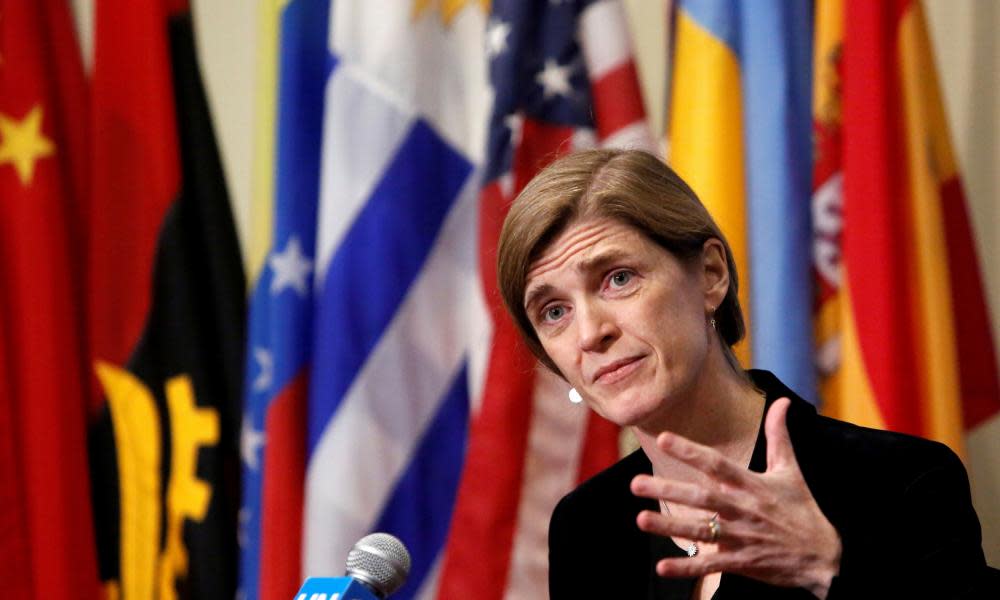Biden names ex-US ambassador to the UN Samantha Power to lead international aid agency

- Oops!Something went wrong.Please try again later.
- Oops!Something went wrong.Please try again later.
Joe Biden on Wednesday named Samantha Power, the former US ambassador to the United Nations, as his choice to lead the US Agency for International Development (USAid), citing her deep experience addressing crises around the world.
“There is simply no one better placed to ensure our development agenda is a core pillar of our foreign policy,” the US president-elect said in a video statement.
Ambassador Samantha Power is a world-renowned voice of conscience and moral clarity—challenging and rallying the international community to stand up for the dignity and humanity of all people. As USAID Administrator, she'll be a powerful force for principled American engagement. pic.twitter.com/jwseGEsb8c
— Joe Biden (@JoeBiden) January 13, 2021
Power was US ambassador to the United Nations in the Obama-Biden administration and also served on Barack Obama’s national security council, as well as being a foreign policy and human rights adviser to the former Democratic president.
Her appointment brings her back into the heart of the Democratic leadership fold. She disagreed fundamentally with the Obama-Biden administration decision not to order military intervention in the war in Syria.
On Wednesday, Power said: “Our security is connected to the security of people who live elsewhere. Many of the issues we in the US are grappling with, the pandemic, the economic crisis, climate consequences, threats to the rule of law, even to democracy – these are issues that people all around the world are grappling with.”
Biden has announced that he would elevate the USAid administrator to have a seat at his White House’s national security council, which will be led by the national security adviser, Jake Sullivan, a significant move after Donald Trump was focused on cutting US aid overseas.
“Power will rally the international community and work with our partners to confront the biggest challenges of our time, including Covid-19, climate change, global poverty and democratic backsliding,” Biden’s transition team said in a statement.
“A crisis-tested public servant and diplomat, Ambassador Power has been a leader in marshaling the world to resolve long-running conflicts, respond to humanitarian emergencies, defend human dignity, and strengthen the rule of law and democracy,” it added.
President-elect Biden has nominated Ambassador Samantha Power as USAID Administrator.
A leading voice for humane and principled American engagement in the world, she will rally the international community and work with our partners to confront the biggest challenges of our time. pic.twitter.com/Gv9G8CLrI5— Biden-Harris Presidential Transition (@Transition46) January 13, 2021
The longtime human rights advocate served as ambassador to the UN under Barack Obama, the former Democratic president, and Biden from 2013 to 2017.
Power, 50, also served as a White House national security staffer under Obama from 2009 to 2013.
A former journalist, she won a Pulitzer prize for her book A Problem from Hell, a study of US failure to prevent genocide. Power covered the war in Bosnia in the 1990s as a freelance correspondent.
Related: Samantha Power: ‘To fall flat in such a public way and to have no job ... I was a wandering person’
Power clashed badly with Obama over whether the US should intervene militarily in the war in Syria, a cloud that hangs over the legacy of the Obama administration.
Power argued for action but ended up on the losing side, drawing accusations of betrayal and hypocrisy from many former supporters and colleagues.
The US gave limited support and training to rebel groups, but made no direct military intervention, even after Bashar al-Assad crossed Obama’s “red line” on chemical weapons, killing hundreds in rebel-held suburbs of Damascus with a sarin gas attack in 2013.
In A Problem from Hell, Power had written admiringly of the US diplomats who had resigned over US inaction in the face of the Bosnian genocide.
When her turn came to step down, she decided against it. She felt she could still achieve results by continually pushing for human rights to be central in foreign policymaking.
Meanwhile, Biden has picked another Obama-administration veteran, Kurt Campbell, to be his White House coordinator for the Indo-Pacific region, which covers the relationship with China, a spokeswoman for Biden’s transition said on Wednesday.
Campbell, who served as the top US diplomat for Asia under Obama, is considered one of the architects of their administration’s “pivot to Asia” strategy, a much-vaunted but still limited US rebalancing of resources to the region.

